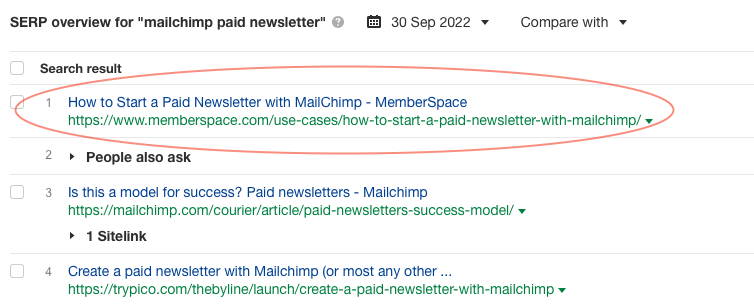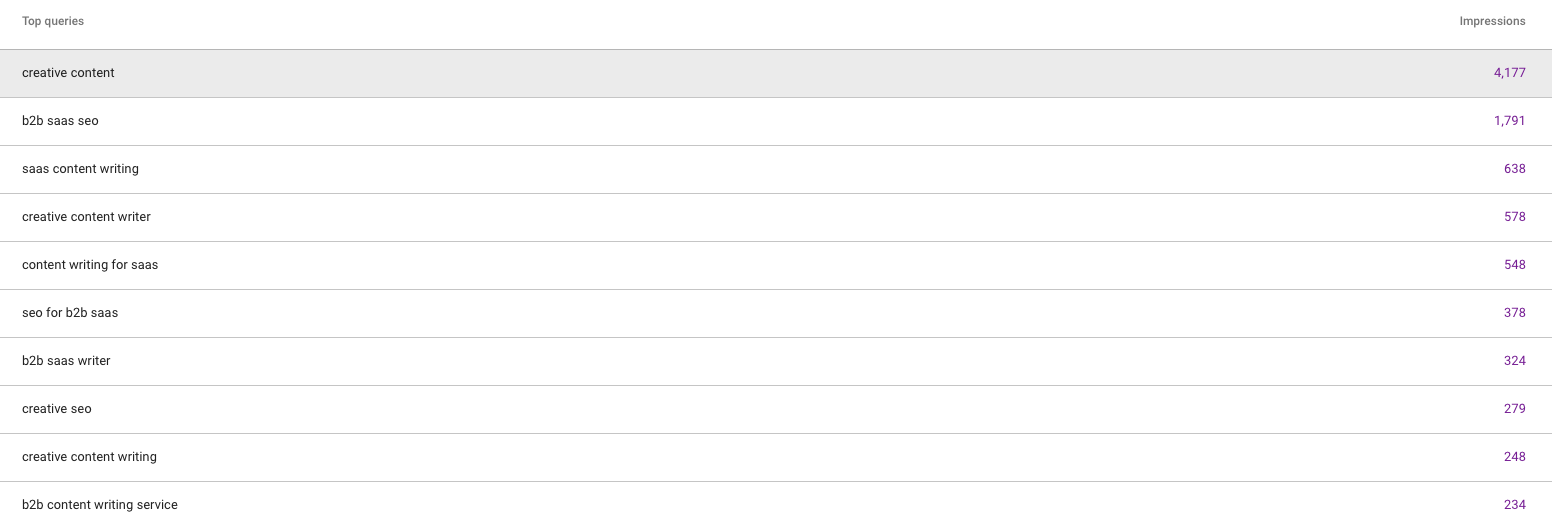Want to try Fathom for yourself? Use my link to get $10 credit on your first invoice.
It may sound strange that an SEO writer doesn’t use Google Analytics on her website, but the truth of the matter is that I don’t need to. While I do sometimes use clients’ Google Analytics accounts when conducting an SEO audit, it’s very, very rare that I dip into GA data when working on SEO writing projects.
Because data privacy is important to me, I ultimately made the decision to fully remove Google Analytics from my website. Now that it’s gone, it’s a lot easier to comply with privacy laws like CCPA and GDPR, and I just feel better about my processes.
The decision to move away from Google’s analytics software
I had Google Analytics tracking code installed on my website for years by default. I figured I might need it, or I might want it. But as time went on, I very rarely looked at it. And it isn’t something I needed from my clients, either, when working on SEO content. So why did I still have it on my website?
As time went on, I continued to become more disillusioned with the level of data that Google Analytics collects. And when Google Analytics 4 rolled out, it was game over for me.
The certifications I’d gotten thus far were going to be less valuable, everything about the rollout seemed like a mess, and Google itself hadn’t even updated their Analytics Academy at the time (it’s since moved to Skillshop). Plus, an increase in ad-blocker usage across the board has reduced the level of data you can get about every website visitor, mobile app user, or e-commerce shopper.
When I relaunched my website with a new CMS, I decided to make a break and do a clean start, away from Google Analytics and Google Tag Manager.
Google Analytics alternative: Fathom Analytics
After uninstalling Google Analytics, I started playing around with alternative web analytics tools that were meant to be more privacy-friendly. Fathom Analytics emerged as the best google analytics alternative in my research, and I did sign up for one of their paid plans for a while. (Remember: if you aren’t paying for a product, you and your data are the product.)
There are two versions of Fathom’s analytics solution: the standard SaaS product you manage through the Fathom website, and an open-source self-hosted one for the real technical folks among us. There’s a WordPress plugin, too!
Fathom Analytics is user-friendly and great for anyone who needs or wants to see simple analytics like page views. It also lets you track campaign URLs, which is essential if you’re running ads or want to see which of your social media campaigns generates the most traffic.
The Fathom platform does not track user journeys across different sites, show you detailed recordings of user actions, or generate heatmaps. It’s a platform that is well suited for solopreneurs or small businesses. (If you’re part of a large company running targeted campaigns across multiple platforms, you’ll still probably need to use Google services—I recognize that this is the landscape we live in, and don’t fault anyone for it.)
Why I decided not to use website analytics tools at all

As a solo business owner who wants to contribute to data privacy online, I definitely preferred—and could get away with—the Fathom Analytics platform over the Google Analytics suite. I still wasn’t using it that much, though!
In my work, I predominantly rely on search engine optimization (SEO) tools like Ahrefs. These tools show me search engine data, not specific website data or identifiable user data. They aren't using cookies to track visitors.
It’s that search engine data that really makes a big difference to me and my clients. I need to know what people are searching before they ever encounter a site. This way, I can figure out how to get my or my client’s site to show up for specific searches.
The optimization that takes place after someone clicks on a website is more conversion rate optimization (CRO) than search engine optimization. While CRO can involve further adjustments to SEO content, it also can involve UX elements such as changing the placement or design of a call to action (CTA). That’s the point at which Google Analytics is more essential.
How can SEO content be privacy-focused?
While I understand that my clients are typically using analytics dashboards and tools to track customer behavior, I am not privy to that data. What I do remains as privacy-friendly as possible.
Here’s what my process looks like without using Google Analytics data—both for myself and my clients.
1. Conduct SEO research using Ahrefs and Clearscope
First, I access search engine metrics and keyword data from two tools that are not reliant on tracking codes embedded in websites.
Ahrefs is an SEO tool that shows me how many searches were conducted for certain terms. The data includes the search term, approximate number of searches per month, and countries from which the searches originate. You can also use Ahrefs to see what terms people searched to find your content, and about how many clicks it generated. Ahrefs does not show me any information about where these searchers went online, and it doesn’t know anything about actions they take once on a website.
Clearscope uses artificial intelligence to figure out what groups of keywords are common across top-ranking content for specific searches. I used to manually pull all of this information by combing through Ahrefs reports, but Clearscope speeds up the process. (Yes, it’s Ai, but it’s not an AI writer, so it passes my test!)
The data I get from both programs is anonymous and broad. While I may know that 100,000 people from the U.S. searched for a specific term last month, I won’t know anything else about who they are.
2. Establish who I’m writing for—and why they’re searching
The next step is to establish who I’m writing for, and why they’re searching for this content.
I have my own information about my target audience that I keep in mind when I write content for myself. If I’m writing for a client, they’ve already completed UX research and understand their customer segments.
I can then pair what I know about the intended audience with SEO data to figure out the type of content we need to create. By looking at search engine results in Ahrefs, I can determine what keywords tend to generate searches by people who are researching, getting ready to purchase, or looking for specific recommendations.
3. Create the content
From here I’ll move forward with creating the content. I’ll keep referring back to my Ahrefs and Clearscope reports to evaluate the content’s potential performance.
While this isn’t set in stone—SEO often requires a little tweaking, updating, and revising down the line as people’s preferred search terms are constantly changing—it typically performs well out of the gate. All without digging into Google Analytics data.
4. Assess actual content performance
Without GA or another analytics platform I don’t have access to daily and monthly page views but I can use SEO tools to see what keywords and URLs are driving traffic to a client’s website.
I can also see if something I’ve written with a particular keyword and search intent in mind is actually ranking for that term, and get an idea of the traffic generated. It’s not exact, but it’s a strong and reliable ballpark figure.
This is the user behavior I need to know: what people are doing in search that leads them to click on a link to content I wrote. I don’t need to know their entire customer journey in order to continue creating well-ranking content for my clients.

Here you can see that an article I wrote, without accessing any Google Analytics data, outranks the domain of the email company whose services it references.
The one Google service I still use
Admittedly, I do still use Google Search Console. This particular offering from Google is more aligned with the type of data collection I do require (i.e. it shows me information about searches that lead to website clicks, not actions taken on my website). This is similar to the data I pull from SEO tools like Ahrefs, and it’s important for making sure my webpages are actually being picked up by search engines.

As you can see in this picture, Search Console is showing me the terms that my website has been showing up for in search results. I don’t have any information about where these searchers came from, though, or what they did after clicking on my website.
Why I’m confident this is the right decision
When I realized I wasn’t touching Google Analytics when creating my content, or my clients’ content, it made sense to create some distance between me and GA. Continuing to use such an intrusively data-heavy program—if I didn’t need to—felt at odds with my personal increasing concerns about data ownership.
I feel that if I’m going to talk about my interest in, and the importance of, data privacy, I need to walk the walk and just talk the talk. I also wanted to show that it really is possible to achieve excellent SEO results without tracking your users around the web. And I did this, with no negative impact to my work for clients.
Plus, the world is moving away from the broad use of data mining tools and platforms like Google Analytics. Entire countries and states are enacting laws to protect customer data from companies like Google.
Do I miss anything about Google Analytics?
Sometimes, I do miss a few features found in GA. It would be nice to continue to see bounce rates (aka how quickly someone leaves a page after they arrive on it, without making any other page clicks). I could get this data back if I reinstalled Fathom Analytics, though, so it’s not gone forever.
Google Analytics also has a neat page flow feature that’s cool—it shows you how people navigate through your website—but it’s not essential for SEO, and I’m willing to give it up in favor of supporting better data protection.
Accessing page flow data and other parts of Google Analytics is definitely still necessary for many parts of digital marketing, including complete A/B testing, predictive advertising, user experience design, and conversion rate optimization. Hopefully, we’ll collectively move toward less data-intrusive practices across the board one day. Until then, I know many digital marketers can’t fully separate from GA.
Note: This page includes affiliate links that, if used, will give me a small commission. You are never required to use these affiliate links, but if you do, you will see no difference in your service or pricing—unless it's cheaper than without the link! Thank you for your support!



